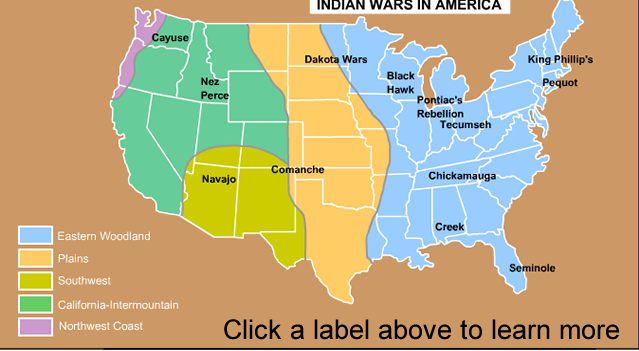Warrior From an Early Age
Tecumseh was born into a Shawnee Indian village sometime around in 1768 in Ohio. His name is said to mean "A Panther Crouching for his Prey" and is derived from his family clan. Tecumseh was exposed to war from a very early age. In 1774, Pukeshinwah, his father, was killed in Lord Dunmore's War (a war between Indians and settlers in Ohio). In the Revolutionary War, many Shawnee villages were raided and plundered by American frontiersmen. After the death of his father, Tecumseh accompanied his brother, a Shawnee war leader, to battles in Ohio and Kentucky against white settlers. Tecumseh also fought among the Cherokee Indians against white settlers in Georgia.
Prophetstown and the Resistance
Tecumseh settled in Ohio with his younger brother Tenskwatawa("The Prophet").Together, the brothers led a resistance against white settlers trying to clear them from the land. The Shawnee chief, Black Hoof, however, favored establishing a peaceful relationship with the settlers and the U.S. government. Because of this disagreement, Tecumseh and Tenskwatawa moved west and founded the village of Prophetstown near the confluence of the Wabash and Tippecanoe Rivers. Soon, Native Americans throughout the country came to Prophetstown. After various Native Indian leaders sold over 2.5 million acres of land to the U.S. Government in the Treaty of Fort Wayne, Prophetstown became a center of resistance. Tecumseh led the resistance with his powerful speeches and leadership qualities. He traveled to Native American groups throughout the land and called for the union of all. He urged individuals to abandon chiefs if they accommodated the White settlers, and join the resistance at Prophetstown. Tecumseh also warned prospective settlers not to settle on Indian land, and that the Treaty of Fort Wayne was illegitimate.
The Battle of Tippecanoe
During one of Tecumseh's recruiting trips to southern lands, American General William Henry Harrison and about 1,000 soldiers marched from Vincennes, Indiana to Prophetstown for the purposes of intimidating the Indians. That night, Tenskwatawa sent his warriors to attack the encampment of American soldiers. The Battle of Tippecanoe ensued, and American forces held their ground and sent the warriors into a full-scale retreat. Prophetstown was subsequently burned to the ground. As a result of the burning of Prophetstown, and because the United States and Great Britain had begun the War of 1812, Tecumseh and his followers joined forces with the British against their common enemy - The Americans.
Tecumseh's Death at the Battle of Thames
Tecumseh and his warriors participated in many major battles of the War of 1812, and helped General Isaac Brock take the American stronghold at Detroit. In October of 1813, however, Tecumseh was killed in the Battle of Thames in present day Ontario, Canada. After his death, the Indian resistance quickly fell apart. Today, several towns in the United States and Canada are named after him.
 |
Death of Tecumseh at the Battle of Thames |
| |
Click on the text in the map to learn about each of the U.S. Government-Indian Wars. |

|